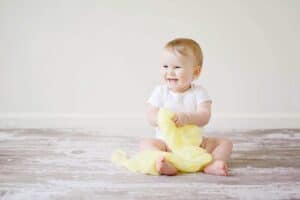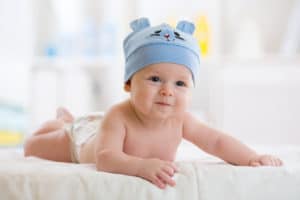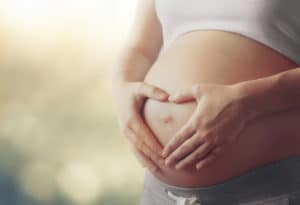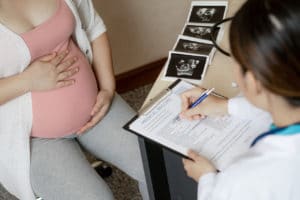Many parents wonder how to act properly in case of diarrhea in the baby. However, since this can occur more often, many uncertainties and ambiguities arise. Is it right to go directly to the doctor or can you wait and see?
What helps and which home remedies for diarrhea in babies are useful? Is there any special food for diarrhea? In the following text you will find helpful information about the right way to deal with diarrhea in babies and other abnormalities in the stool.
Table of contents
Why Do Babies Have Diarrhea?
When babies are born, their digestive system is not yet fully developed. That’s why diarrhea can happen more often in the first few months. Sometimes it is also due to the mother’s milk, if it has a slightly lower fat content.
This makes the milk more fluid and can affect the baby’s bowel movements. Also later, when you start giving your baby porridge and solid food, you will notice that he or she gets diarrhea from time to time. This also happens, for example, if your baby is too much fruit at once.
Diarrhea in babies often occurs as an accompaniment to other illnesses. Since the intestines are sensitive to stress, diarrhea often occurs during teething, fever and changes. Sometimes, however, it can have a more serious cause, such as a gastrointestinal infection or food intolerances. Diarrhea in babies can also occur after vaccinations.
What Foods Can Cause Diarrhea?
Just as some foods can bind stool and prevent or improve diarrhea, there are also foods that can cause diarrhea in baby. Because the baby’s intestines and immune system are not yet sufficiently developed, drinking water that has not been boiled can cause diarrhea.
German drinking water is subject to strict controls and is safe for older children and adults. However, the child’s immune system may not yet be able to properly process the bacteria it contains. Fruit juices and fruit pulp in larger quantities can cause diarrhea in babies.
The reason for this is the high fructose content, which has a laxative effect. Besides, this often causes babies to become sore in the intimate area and makes for severe pain and crying when changing diapers.
It is therefore advisable to avoid juices or to give them diluted with water in small quantities. Due to their high protein content, cow’s milk products cannot yet be processed well by the baby’s intestines and can cause diarrhea and even allergies.
When giving porridge, make sure that you do not season it too much. This can also cause diarrhea in the baby. Raw or undercooked eggs, raw meat, and raw fish should also be avoided, as they overtax the baby’s immune system.
When Is Diarrhea Said To Occur?
Because babies generally don’t have very solid stools, it’s hard for many parents to distinguish what is called diarrhea. But as a mom, you will know your baby very well and notice when your baby’s elimination changes in some way.
Very watery stools that occur about 3-5 times a day are called diarrhea. Usually diarrhea in the baby occurs with many other accompanying symptoms. The baby has no appetite, vomits, has a fever, loses weight or has a bad mood.
It may also have abdominal pain, which is usually manifested by a hard abdominal surface or a bloated belly. You can usually also tell that something is wrong by the smell. Often, diarrhea in the baby smells very stern and pungent.
Green Stools
Green stools in babies are common and usually have a harmless cause. When babies are born, they have a very dark stool at the beginning, which is then also referred to as “puerperal vomit”.
As they transition from what is called puerperal stool to normal breast milk stool, green stool may appear until it eventually turns a healthy yellowish color. In children fed artificial formula, green stools are normal and not a cause for concern. Green stools may also occur when taking antibiotics and also supplements such as iron.
If your baby’s bowel movements are almost explosive and very liquid, and the stool is also quite green in color, something may not be going right with breastfeeding. Often, the cause is that the baby is put on the breast incorrectly and quenches its thirst with the very thin milk from the front breast.
In this case, it is helpful if you talk to your midwife and get tips on how to put your baby on differently. Green stools can also be a sign of diarrhea in the baby. If your baby has green stools for no apparent reason, it is advisable to see your pediatrician.
My Baby Has Diarrhea – What To Do?
Often you can solve the problem yourself with a few tricks and home remedies. Sometimes, however, it is advisable to see the doctor. In all cases, it is important that the baby drinks a lot.
Besides milk, porridge or water, fennel tea can help. Electrolyte-glucose mixtures from the pharmacy also help to compensate for fluid loss.
Home Remedies For Diarrhea In Babies
1. Hot Water Bottle Or Grain Pillow For Abdominal Pain
The warmth helps the abdominal muscles relax. Make sure it doesn’t get too hot for your baby. If in doubt, you can wrap a towel around the hot water bottle.
2. Potato Wrap For Abdominal Pain
For potato wraps, potatoes are boiled and cooled until they are still soothingly warm but do not burn. The potatoes are mashed, spread on a gauze pad, and wrapped around the baby’s tummy. This is helpful for babies who move around a lot and might kick a hot water bottle off them.
3. Blackberry Leaf/Camomile And Blueberry Teas
The ingredients in these teas are anti-inflammatory and soothe the intestinal flora. Additionally, your baby will get enough fluids.
4. Small Grated Apple
For older babies who are already getting porridge, it can be helpful to grate an apple into small pieces. This releases the ingredient pectin, which should bind the harmful substances in the intestine and prevent diarrhea in the baby.
5. Strongly Diluted Black Tea
The ingredients soothe the intestinal mucosa.
These Foods Help With Diarrhea
- Breastfeed your baby more often than normal. Breastfeeding gives him enough fluids and also natural protection for the immune system.
- For older babies, banana can help. A mashed banana mixed with some rusk can help make stools firmer again.
- Mashed potatoes, blueberries or carrots make for firmer stools.
- Refrain from dairy, oil, or other fatty products, as these may loosen stool and cause further diarrhea in baby.
Helpful tips for making baby porridge can be found here: https://www.practicalmommy.com/babybrei-selber-machen-das-sollten-sie-beachten/
When should I See The Doctor If I Have Diarrhea?
As a general rule, it is better to see the doctor once more than too little. If you have the impression that your baby is losing a lot of fluid and you cannot compensate for the loss, you should see a doctor quickly. The small body of a child is dehydrated much faster than that of us adults.
Typical Signs Of Dehydration Are:
- Sunken fontanel.
- Sunken eyes.
- Apathy.
- Little urine in the diaper.
- Crying without tears.
- Dry skin or lips.
If you notice these signs in your baby, you should go to the doctor. A high, prolonged fever above 38°C and persistent, extremely watery, and possibly bloody diarrhea in the baby are also reasons to have the child examined by a specialist as soon as possible.
How Can Diarrhea In Babies Be Prevented?
Since diarrhea in babies can also occur due to poor hygiene caused by bacteria and viruses, it is important to boil the bottle and pacifier at regular intervals. Toys that your child often puts in its mouth should also be cleaned from time to time.
If you have had contact with people who have the stomach flu, you should take care not to lick your baby’s spoon when feeding, because you could also transmit pathogens.
Remember to wash your hands regularly with soap, especially if you come into contact with things your baby puts in his or her mouth. If you keep these points in mind, diarrhea can still happen to your baby, but the risk is lower and you won’t have anything to blame yourself for if it does happen.











4 thoughts on “Help, My Baby Has Diarrhea! Here You Will Find The Best Tips”